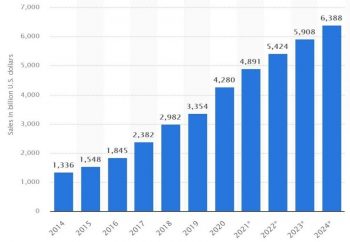Why is 2024 a Great Year to Start Your E-commerce?
The year 2024 looks great for starting an e-commerce business. With the world getting more digital & connected, e-commerce in 2024 seems to have a shining future. Now an integral part of global commerce, it offers an array of opportunities for entrepreneurs to establish and flourish in the digital marketplace. With the new e-commerce trends, it becomes clear that the union of various factors makes this year particularly auspicious for venturing into the online business. So, let’s dive into why 2024 is a great year to start an e-commerce business. Are you ready?
E-commerce Market Growth | E-commerce in 2024
- According to Statista, the global e-commerce market is projected to reach $6.4 trillion in sales by 2024, growing at a compound annual growth rate (CAGR) of 16.5% from 2020 to 2024.
- According to Statista, m-commerce accounted for 73% of all e-commerce sales in 2023, surpassing desktop sales for the first time.
- According to Influencer Marketing Hub, influencer marketing campaigns earn an average of $5.20 for every dollar spent, with 89% of marketers citing influencer marketing as effective in generating ROI.

Top Reasons to Start an E-commerce Business This Year
Global E-commerce Market Analysis
The global e-commerce market continues its lightning rise, propelled by increasing internet penetration, smartphone adoption, and evolving consumer behaviors. With projections indicating robust growth in 2024, entrepreneurs have a vast playground to explore. Regions like Asia-Pacific and North America lead the charge, boasting mature e-commerce ecosystems and high consumer spending. However, emerging markets in Africa and Latin America present untapped potential, promising opportunities for savvy entrepreneurs willing to navigate diverse spaces.
Technological Advancements
Technological innovations are the cornerstone of e-commerce evolution, shaping how businesses operate & consumers interact with online platforms. In 2024, artificial intelligence (AI), augmented reality (AR), virtual reality (VR), and the Internet of Things (IoT) stand at the forefront of this transformation. AI-powered chatbots streamline customer support, AR & VR enhance the shopping experience – while IoT devices enable smooth connectivity between products and consumers. Moreover, blockchain technology is gaining traction for its potential to revolutionize payment processing and secure transactions, promoting trust & transparency in e-commerce.
Don’t Miss:- Transform Your Business with a WordPress E-commerce Website
Mobile Commerce Dominance
Mobile commerce (m-commerce) has emerged as the undisputed king of e-commerce, commanding a significant share of online sales worldwide. With smartphones becoming universal, consumers increasingly prefer the convenience of shopping on the go. Thus, optimizing e-commerce platforms for mobile devices is no longer a luxury but a necessity. Responsive design, mobile-friendly interfaces, and dedicated mobile apps help provide flawless shopping experiences and ensure businesses stay competitive in an increasingly mobile-centric market.
Personalization & Customer Experience
Today, consumers seek tailored experiences that resonate with their preferences and tastes. With data analytics, e-commerce businesses can obtain invaluable insights into consumer behavior, enabling them to deliver targeted recommendations and personalized marketing campaigns. From curated product suggestions to customized offers, the power of personalization lies in its ability to encourage deeper connections and drive repeat purchases, ultimately enhancing customer loyalty & satisfaction.
Sustainable E-commerce Practices
Amid growing environmental concerns, sustainability has become a prominent consideration for consumers. E-commerce businesses are thus compelled to adopt eco-friendly practices and offer sustainable products to align with evolving consumer values. From eco-friendly packaging to carbon-neutral shipping options, there are various ways for businesses to demonstrate their
Logistics & Fulfillment Innovations
commitment to sustainability. Moreover, integrating sustainability into brand identity attracts environmentally-conscious consumers and sets businesses apart in a crowded marketplace.
Social Commerce & Influencer Marketing
Social media platforms have emerged as rich catalysts for e-commerce growth, blurring the lines between social networking & online shopping. Consumers increasingly rely on recommendations from influencers and peers while deciding to buy, turning to platforms like Instagram & YouTube for product discovery. Therefore, influencer marketing presents a golden opportunity for e-commerce businesses to amplify their brand reach, drive engagement, and forge authentic connections with target audiences. By partnering with influencers whose values align with their brand, companies can use the power of social commerce to drive sales.
Must Know:- Why Is There So Much Money in E-commerce? And Why Must You Do E-commerce?
Efficient logistics and fulfillment operations are essential pillars of e-commerce success, enabling businesses to deliver reliable shopping experiences to customers. In 2024, the focus is on enhancing last-mile delivery efficiency and reducing delivery times to meet consumer expectations for speed & convenience. This entails leveraging emerging technologies such as drones, autonomous vehicles, and routing algorithms to optimize delivery routes and streamline order fulfillment processes. Furthermore, warehouse automation and inventory management are revolutionizing how e-commerce businesses manage their supply chains to improve inventory visibility and reduce fulfillment costs.
Marketplace Expansion Opportunities
Expanding beyond one’s own e-commerce platform to third-party marketplaces is a strategic imperative for businesses looking to maximize their reach and tap into new customer segments. In 2024, multi-channel selling is not just an option but a necessity for staying competitive in a crowded marketplace. By diversifying their sales channels and using established marketplaces like Amazon – businesses can access a vast pool of ready-to-buy consumers and benefit from the built-in trust of these platforms. However, navigating the complexities of marketplace selling requires a strategic approach, including careful product selection, pricing optimization, and brand management to stand out amidst fierce competition.
Regulatory & Legal Considerations
As the e-commerce space evolves, so do the regulatory and legal considerations that govern online businesses. In 2024, compliance with data privacy regulations such as the GDPR and CCPA is of utmost importance, with consumers increasingly concerned about how their personal information is collected, used, and shared online. Therefore, e-commerce businesses must implement robust data protection measures and transparent privacy policies to build credibility. Additionally, staying abreast of evolving regulations and industry standards is essential to avoid costly fines and legal repercussions, necessitating ongoing monitoring & adaptation to ensure compliance.
Also Read:- E-commerce Evolution: Trends & Technologies Shaping the Industry
Bottom Line
2024 represents a pivotal moment for aspiring e-commerce entrepreneurs to seize the flying opportunities. With the global e-commerce market poised for continued growth, fueled by technological innovations, changing consumer behaviors, and shifting regulatory landscapes – the time is ripe for joining & expansion. By embracing emerging trends, leveraging cutting-edge technologies, and prioritizing customer-centricity & sustainability – businesses can carve out their niche and thrive in the dynamic and ever-evolving e-commerce space. As we embark on this journey, let us seize the moment and chart a course toward a prosperous future in this vibrant world.
FAQs
How do I start an e-commerce business?
You can start by identifying your niche, conducting market research, creating a business plan, choosing a suitable e-commerce platform, sourcing products, and setting up your online store. Or, you can also connect with an e-commerce development agency like Provis Technologies for the same.
Write characteristics of a successful e-commerce website?
A successful e-commerce website should have a user-friendly interface, secure payment options, mobile responsiveness, high-quality product images and descriptions, easy navigation, and efficient customer support.
How can I drive traffic to my e-commerce website?
You can drive traffic through search engine optimization (SEO), social media marketing, content marketing, email marketing, influencer partnerships, paid advertising, and optimizing the listing of products based on keywords.
How do I handle shipping & fulfillment?
You can handle shipping and fulfillment by partnering with reliable shipping carriers, offering multiple shipping options to customers, optimizing packaging to reduce costs, implementing order tracking systems, and outsourcing fulfillment to third-party logistics providers if needed.
What are the key metrics to track for e-commerce success?
Key metrics to track include website traffic, conversion rate, average order value, customer acquisition cost, customer lifetime value, cart abandonment rate, and return on investment (ROI) from marketing efforts.
How do I look after the security of my e-commerce website?
You can ensure website security by using secure sockets layer (SSL) certificates for data encryption, implementing robust authentication measures, regularly updating software and plugins, conducting security audits, and complying with data protection regulations like GDPR & CCPA.
Written By
Author's Picks
- How to Install WooCommerce in WordPress? | A Step-by-Step Guide
- 17/12/2024
- Best Web Development Tools For 2023
- 08/07/2023
- 6 Steps to Create a Business Plan for Mobile App Startup
- 24/02/2025
Categories
- AI for Startups
- AI in Web Development
- AI Integration
- AI Platforms
- AI Prompt
- AI Tools
- AI Trading Software
- Android App
- Android vs iOS Development
- Angular
- API
- API Development
- App
- app development
- App Idea
- App User Feedback
- Application
- Artificial Intelligence
- Audit Services
- Automotive Industry
- Awards and Recognition
- Business Consulting
- Business Website
- Chatbots
- CRM
- CRM for Financial Advisors
- Custom CRM
- Custom SaaS
- Custom Website
- Customer Service
- dashboard design
- Developing a Mobile App
- Digital Business
- E-commerce
- EMR Integration
- Finance
- Financial Advisors
- Financial Advisors
- GIT
- Health Insurance
- iOS App
- iOS App Development
- IoT Mobile App Development
- IoT Platforms
- IT Audit Services
- IT Consulting
- IT Strategies
- Java Development
- Laravel
- Lean Canvas
- Learning Management System
- Logistics Apps
- Mobile App Development
- MVP
- Native App
- News Aggregator Site
- OTT
- Outsourcing IT
- Payment Gateway
- predictive analysis
- Product Launch Strategy
- Progressive Web App (PWA)
- Prototype
- Recommender Systems
- Ruby
- SaaS
- SaaS Application
- SaaS Business
- SaaS Company
- SaaS Development
- SaaS Product
- SaaS Project
- Sales Funnel
- SEO
- Shopping Cart
- Software Development
- SSL and TLS
- Startup Checklist
- Technology
- Tetradic Color Scheme
- UI/UX Design Company
- Unit Testing
- User Flow
- User Testing
- Web Development
- Web Performance Optimization
- website Maintenance Services
- Website Migration Service
- Website Speed Optimization
- WooCommerce
- WordPress





